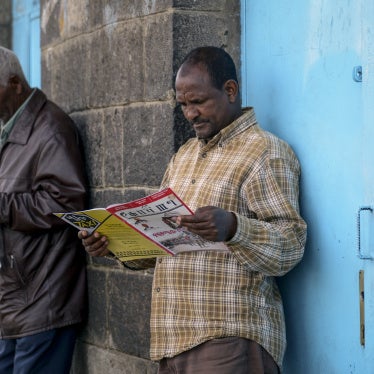(Nairobi) – The government of Chad should adhere to its international legal obligations and respect human rights law while it investigates an alleged plot against the government, Human Rights Watch said today.
At least six people were initially detained, including two members of parliament. All six were held incommunicado from their arrests on May 1 and 2, 2013, until May 8, although Chadian law provides that detainees may only be held for 48 hours, renewable for another 48 hours, after which they must be released if they are not formally charged. On May 8, two other members of parliament were detained.
“The threat of a coup is no excuse to ignore or compromise due process or the rule of law,” said Daniel Bekele, Africa director at Human Rights Watch. “On the contrary, in a politically charged situation, it is all the more important for investigating authorities to fully respect the suspects’ rights and to be open about their investigation. The fact that detainees were held without charge beyond the four days Chad’s laws allow is cause for concern.”
On May 1, the government announced that it had foiled an attempt to “destabilize the institutions of the Republic” and that it had arrested some people who were involved. On May 8, President Idriss Déby Itno denounced a “conspiracy like the Arab spring.” A government spokesman said that the group had been conspiring for several months and had been under government surveillance since December 2012.
On May 8 and May 9, seven of the detainees were brought before a judge and formally charged with plotting, seeking to undermine the constitution, and accessory to murder.
The accused and their lawyers should have full access to any evidence that supports the charges brought against them so they can answer the charges and prepare a defense, Human Rights Watch said. Anyone prosecuted in connection with the alleged coup is entitled to a fair trial in accordance with international standards, as set out in the International Covenant on Civil and Political Rights and the African Charter on Human and People’s Rights. Chad is a party to both.
Those charged include Saleh Makki and Gali Gatta Ngothé, opposition members of parliament; Mahamat Malloum Kadre and Routouang Yoma Golom, members of parliament from President Déby’s ruling party; General Ngomine Beadmadji; General Weiddig Assi Assoué; and Colonel Ngaro Ahmadou Ahidjo. All are being held in the Bureau of Investigation (Renseignements généraux) except for General Ngomine, who was released for health reasons. The lawyer for several of the detainees, Mahamat Hassan Abakar, told Human Rights Watch that three of the men had called him to express fear on May 9 for their safety. Abakar was unable to visit his clients on May 9.
The alleged ringleader of the conspiracy, Moussa Tao Mahamat, a former rebel, was arrested on May 1. His whereabouts are unknown.
Two other members of parliament, Saleh Kebzabo and Ngarjely Yorongar, were also summoned for questioning. On May 8, Yorongar was released after questioning. Kebzabo is abroad.
On May 3, the former vice-president of the University of N’Djaména, Dr. Khalil Alio, was arrested. On May 6, the secretary general of the National Union of Chadian Journalists, Erik Topona, was arrested and charged with violating the constitution. Another journalist, Moussey Avenir de la Tchiré, director of bi-monthly publication Abba Garde, was arrested on May 8.
In February 2008, in the aftermath of a failed rebellion, the Chadian government arrested several political opponents, including Yorongar, former President Lol Mahamat Choua, and Ibni Oumar Mahamat Saleh. Following his arrest, Saleh was forcibly disappeared and remains unaccounted for. Enforced disappearances are strictly prohibited in all circumstances and constitute a serious crime under international law. His fate should be immediately made known and those responsible for his disappearance brought to justice.








